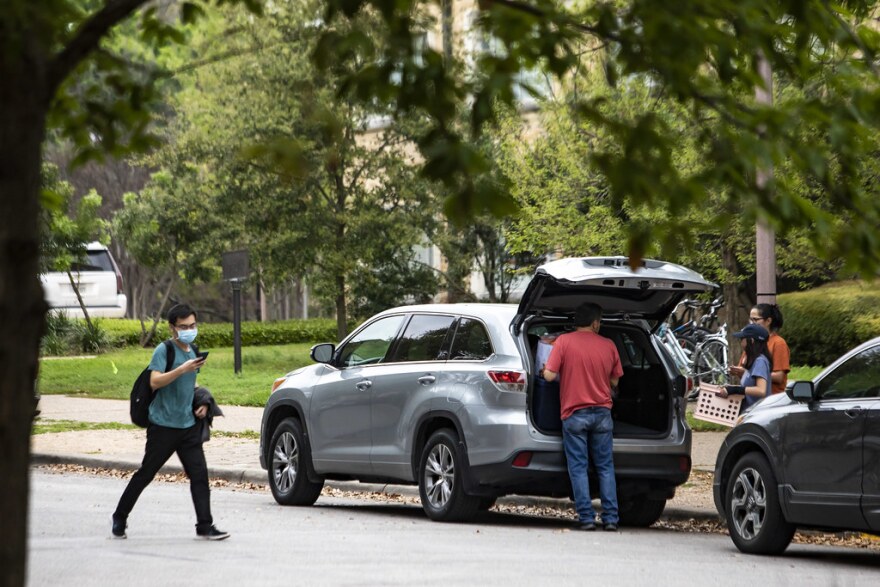College students in Austin are at risk of being severely undercounted in the 2020 census, which could put federal funding and political power for young people at risk for the next decade.
The 2020 census – a national headcount that happens every 10 years – started back in March. That was also the middle of spring semester at UT Austin, and groups were starting to urge students to submit their information.
But then, the COVID-19 pandemic forced students out of the classroom.
“Filling out the census wasn’t at the top of everyone’s mind,” said Anagha Kikkeri, UT's student body president.
Once students left campus, Kikkeri said, the main way to get word out for something like the census wasn’t an option anymore.
“On campus it is so much easier to spread the word… when you are in person,” she said. “It’s also so much easier when you don’t have your mind on a pandemic.”
As a result, census tracts that include a lot of college students in Austin are vastly underresponding to the count.
The spokesperson for MOVE Texas, which is working to get young people civically engaged, said while Travis County as a whole is at about a 60% response rate, student populations are far behind.
“In the communities that students live in around town, we are seeing response closer to 20 and 25%,” Charlie Bonner said. “So a really dramatic drop off.”
And there are a lot hurdles compounding the fact that students haven’t been on campus in a while.
Ricky Cooks, a rising UT senior and president of the Tejas Club, said this is all brand-new to college students.
“I was 11 the last time a census was filled out,” he said. “So this is everyone’s first time doing it for themselves basically.”
Cooks said it’s also not easy to convince young people that it’s in their best interest to hand over their information to the government.
“It’s just tricky because you know the second you mention the government or politics people, for whatever reason, it can become a little more hostile,” he said.
Cooks said he understands, however, where some students are coming from, particularly undocumented students who might be scared to fill out the census –even though the questionnaire does not ask about citizenship.

Regardless of the trepidation, the stakes are high.
UT Austin has about 52,000 students enrolled. Add Huston-Tillotson, St. Edwards and Austin Community College, and students make up a significant portion of the county's overall population, Travis County Tax Assessor Bruce Elfant said.
“There’s 50-, 60-, 70,000 college students here – maybe more,” Elfant said. “We sure want to make sure all of them are counted.”
Elfant said getting these students to fill out the census was difficult during good times, and it’s just that much harder with students scattered.
“We would have expected students to be at school this semester and obviously that didn’t happen,” he said.
Elfant said the financial losses from students not filling out the census could be staggering: Every person who is not counted will cost Travis County about $1,500 a year.
That could jeopardize services like bus routes near student housing. And, in general, means less federal funding for the schools.
“The effects will be extraordinary,” Cooks said. “And I don’t want the UT campus community to lose a bunch of money and power. It’s honestly mind-blowing how big of a deal the census is.”
"There's no member of Congress that is responsible to the thousands and thousands of students that live in Travis County. And so we don't have people going to Washington to champion [their] values, and no one accountable to the young people who call Central Texas home."
The loss of political power is what Kikkeri said she’s most concerned about.
“We want our voting power as students to have weight still,” she said.
The census plays a vital role in how political boundaries are drawn, which happens every 10 years. If fewer college students appear to be scattered across the city, according to census data, it’s harder for them to make up a significant part of any political district.
Bonner said that translates into less representation for college students and the issues that matter to them, which is already a big issue in Austin.
“UT students live in four or five congressional districts,” he said. “So, there’s no member of Congress that is responsible to the thousands and thousands of students that live in Travis County. And so we don’t have people going to Washington to champion [their] values, and no one accountable to the young people who call Central Texas home.”
Bonner, Kikkeri and Cooks have been working to get student groups and local voting groups to reach out to students through social media and text to remind them to fill out the census, which is mostly online this time around.
They say they are also making sure to let everyone know how much have they have to lose if they don’t.
Got a tip? Email Ashley Lopez at alopez@kut.org. Follow her on Twitter @AshLopezRadio.
If you found the reporting above valuable, please consider making a donation to support it. Your gift pays for everything you find on KUT.org. Thanks for donating today.






